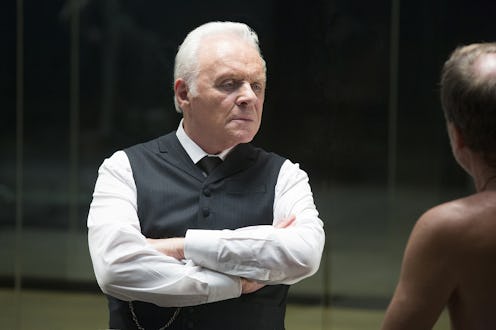
There are many questions left lingering as the intriguing and eagerly-anticipated Westworld series premiere draws to a close. Since this was just the first episode out of what's designed to be at least a five-year journey, we likely won't get many answers for a while. But the premiere did provide one key clue in its final scene that, while it may not answer any specific questions quite yet, at least provides a tease of what audiences can expect from the show moving forward… and it doesn't sound too good for anyone, human or "host" alike.
The clue came at the very end of the hour, when Head of Security Ashley Stubbs (Luke Hemsworth) asked host Dolores Abernathy (Evan Rachel Wood) what her father told her shortly before he glitched out. Her father started malfunctioning after he discovered a photograph of a woman in modern day Times Square buried in the dirt of his farm; he soon went off-script and whispered something unintelligible in his daughter's ear. This is at least one mystery we didn't have to wait to be solved, since Dolores immediately divulged what her father had told her as soon as Stubbs asked: "These violent delights have violent ends."
What exactly does this mean? The park's creator, Mr. Ford (Anthony Hopkins) revealed that the robot portraying Dolores' father had previously operated as part of a horror narrative called "The Dinner Party," in which he played The Professor, the leader of a group of cannibal cultists prone to quoting John Donne, Gertrude Stein, and William Shakespeare. Apparently the robot was somehow accessing his memories of this previous role — even though it should have been wiped completely — and was once again quoting the Bard.
The line in question comes from Act 2, Scene 6 of Romeo And Juliet, and is spoken by Friar Lawrence after Romeo impatiently urges him to hurry up and conduct his marriage to Juliet. Here's the Friar's response in full:
These violent delights have violent endsAnd in their triumph die, like fire and powder,Which as they kiss consume. The sweetest honeyIs loathsome in his own deliciousnessAnd in the taste confounds the appetite.Therefore love moderately. Long love doth so.Too swift arrives as tardy as too slow.
This is not just a vague warning of the potentially dire consequences of lust, but a specific caution against moving too quickly or acting without thinking. The Friar is advising Romeo that, like the spark meeting the gunpowder, he and Juliet will explode and destroy each other with the intensity and unheeding haste of their passion. Honey that's too sweet can spoil the taste, and love that's left unchecked may very well end badly.
This reference applies to multiple levels of Westworld's twisty narrative. It obviously pertains to the relationship between Dolores and her paramour, the dashing gunslinger Teddy Flood, which burns hot and then fizzles out with each repetition of the park's narrative. It can also be interpreted as a warning to Westworld's hedonistic customers, who leave no impulse unchecked, raping and killing their mechanical hosts at will. And it also applies to the park's architects, who may be moving too quickly by putting Dolores back into operation before they fully understand the glitch that caused the breakdown in her storyline in the first place.
On every level, this is very bad news. Obviously we all know how Romeo And Juliet ends: with the protagonists dead (along with several other supporting characters to boot) and everyone else in mourning. If Westworld is already quoting that tragedy in its very first episode, then viewers probably shouldn't expect the show to have a much happier ending than Shakespeare's most famous play.
Images: John P. JohnsonHBO; Courtesy of HBO